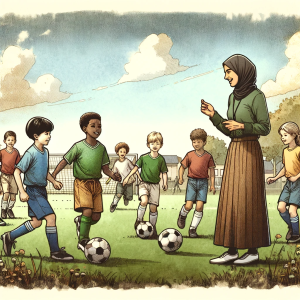
Embracing the Psychological Aspect of Women’s Soccer
Women’s soccer has undergone an incredible transformation in recent years. From the rise in participation rates to the professionalization of elite playing standards, women’s soccer has become a phenomenon worth watching and studying. Alongside these advancements, an intriguing aspect of the sport has started to gain more focus: psychology.
Psychology research in women’s soccer: a scoping review delves into this realm, offering us a glimpse into the current state and evolution of psychology-related research in women’s soccer.
The Evolution of Psychological Research in Women’s Soccer
The review, a comprehensive examination of 280 peer-reviewed articles up to April 2023, reveals a significant shift in focus towards the psychological factors influencing women’s soccer. This shift is vital because previous research mainly centered on male players, leaving a gap in understanding women’s specific psychological needs and experiences in soccer.
The study’s findings demonstrate a notable increase in publications on psychology in women’s soccer, especially around significant events like the FIFA Women’s World Cup and UEFA Women’s Euro. This uptick suggests a growing recognition of the importance of psychological factors in shaping players’ performance and overall health.
Insights for Soccer Coaching and Player Development
- Understanding Emotional Dynamics: The study highlights that anxiety, stress, and coach behavior are the most researched topics. This insight is crucial for coaches and player development programs, as understanding these emotional dynamics can lead to better player support systems and coaching strategies.
- Emphasizing Environmental Factors: The role of environmental factors in influencing players’ mental states has been underlined. Coaches and teams can create more supportive and positive environments that nurture players’ mental well-being and help them perform better.
- Tailoring Training to Women’s Needs: The study underscores the need for tailored psychological support and training for women players. Coaches should be aware of the unique challenges and pressures women face in soccer and adapt their coaching methods accordingly.
- Promoting Psychological Skills Training: The increasing focus on decision-making and cognitive skills within the research suggests incorporating psychological skills training in player development programs.
The Future of Women’s Soccer: A Psychological Perspective
This scoping review is the first to map out all psychology-related research in women’s soccer, covering an impressive range of topics and categories. Its findings pave the way for future research to address the gaps in our understanding of the psychological aspects of women’s soccer. Such research can significantly influence coaching techniques, player development programs, and overall strategies in women’s soccer.
Conclusion
This review offers invaluable insights into the evolving field of women’s soccer psychology. Its findings highlight the need for more focused research and the potential benefits this can bring to player development and coaching strategies. As the sport continues to grow, embracing and understanding the psychological aspect of women’s soccer will be crucial in nurturing talent and pushing the boundaries of what these incredible athletes can achieve.



